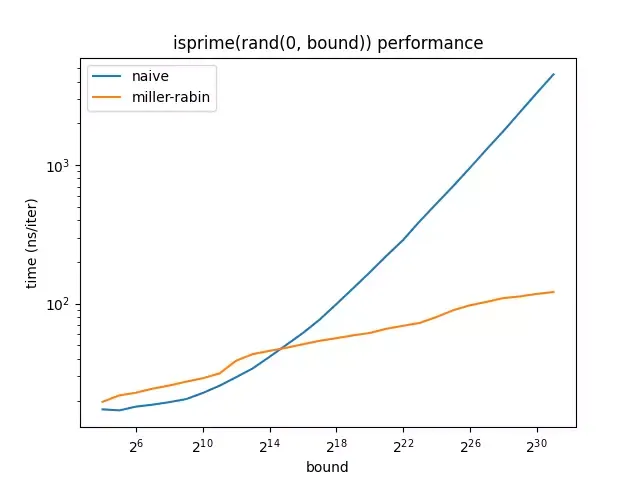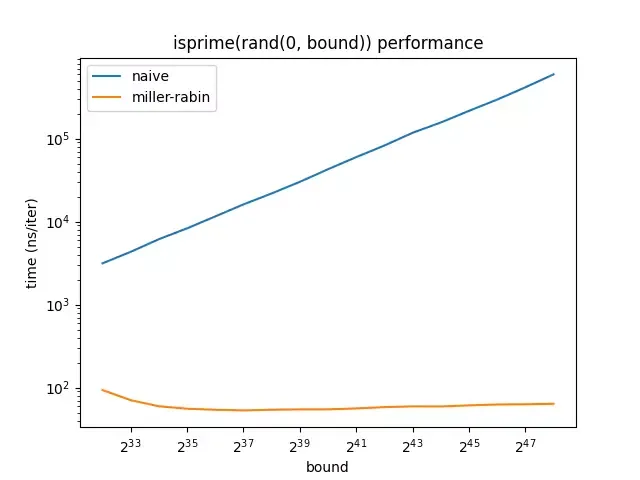If you're hacking together
We’ve all had to include a little isprime() function in our code, right? (well, most people reading my blog probably have). In this article i provide an implementation of a primality test (in C) that is quite a bit faster for larger values, and is still easily embeddable and usable within existing applications
Naive Implementation
Most programmers, when asked to check whether a number is prime, would probably write some code like the following (myself included):
// check whether 'n' is prime, using a naive method
bool
isprime_naive(size_t n) {
// take care of 0,1
if (n < 2) return false;
// get rid of even numbers, except 2
if (n % 2 == 0) return n == 2;
// do trial division, checking only the odd numbers <= sqrt(n)
size_t i;
for (i = 3; i * i <= n; i += 2) {
// divisible, so not prime
if (n % i == 0) return false;
}
// no factors, so must be prime
return true;
}
While there’s nothing wrong with this code, and it arguably is the best solution if you only use it a couple of times, there are more efficient deterministic tests for larger numbers. For example, we’ll look at using the Miller-Rabin primality test, modified to be deterministic for a suitable range of ‘n’
Miller-Rabin implementation
I’m just going to include the full implementation here, so you can copy and paste, and read the comments to understand how it works:
/* Miller-Rabin 'isprime()' implementation
*
*
* NOTE: https://en.wikipedia.org/wiki/Miller%E2%80%93Rabin_primality_test
* @author: Cade Brown <cade@cade.site>
*/
// (internal) compute a**b (mod m)
static size_t
my_modpow(size_t a, size_t b, size_t m) {
// a**2**i (mod m)
usize a2i = a;
// the result product
usize res = 1;
// basically, iterate over the bits of 'b', and treat it
// as a bitset
while (b) {
if (b & 1) {
// this power should be included, since its in the bitset
res = (res * a2i) % m;
}
// compute, and apply modulo to avoid overflow:
// a**2**(i+1) == (a**2**i)**2
a2i = (a2i * a2i) % m;
// now, shift the bitset
b >>= 1;
}
return res;
}
// (internal) perform a witness check in Miller-Rabin, returns whether it is probably prime
// a: the witness being tested
// n: the number being checked for primality, n := 2**r * d + 1 (i.e. within the 2-adic number system)
// r: see 'n'
// d: see 'n', must be ODD
static bool
my_witness(size_t a, size_t n, size_t r, size_t d) {
// compute a ** d (mod n)
size_t x = my_modpow(a, d, n);
// special case that it's probably true for this witness
if (x == 1 || x == n - 1) {
return true;
}
// repeat (r-1) times
size_t ct;
for (ct = 0; ct < r - 1; ct++) {
x = (x * x) % n;
if (x == n - 1) {
// probably true as well
return true;
}
}
return false;
}
// tell whether 'n' is prime
bool
isprime(size_t n) {
if (n < 2) return false;
if (n % 2 == 0) return n == 2;
// compute: n := 2 ** r * d + 1
// (i.e. decompose into 2-adic number)
size_t d = n - 1;
size_t r = 0;
while (d % 2 == 0) {
r++;
d >>= 1;
}
// utility macro for a single witness
#define WIT(_a) my_witness((_a), n, r, d)
// use proven bounds
/**/ if (n < 2047ULL) return WIT(2);
else if (n < 1373653ULL) return WIT(2) && WIT(3);
else if (n < 9080191ULL) return WIT(31) && WIT(73);
else if (n < 25326001ULL) return WIT(2) && WIT(3) && WIT(5);
else if (n < 3215031751ULL) return WIT(2) && WIT(3) && WIT(5) && WIT(7);
else if (n <= 0xFFFFFFFFULL) return WIT(2) && WIT(7) && WIT(61); // 32 bit values
else {
// this is a catch all, which should work up to
// 18446744073709551616 = 2**64
// so, this is only needed on 32 bit systems
return WIT(2) && WIT(3) && WIT(5) && WIT(7) && WIT(11) && WIT(13) && WIT(17) && WIT(19) && WIT(23) && WIT(29) && WIT(31) && WIT(37);
}
}
Here’s how they perform on my machine, calculating whether 10 million random numbers are prime, within different bounds:

Here’s a comparison of even larger (> 32 bit values) trends in performance:

As you can see, both implementations have similar performance (with naive being a little faster), until , at which point the trend reverses. The trends become even more pronounced after , where the Miller-Rabin implementation essentially always hits the ‘else’ case, and plateaus.
For large values, the Miller-Rabin implementation 30x-50x faster than the naive one! I know this implementation has helped many of my other projects efficiently implement prime checking (check out PGS!)